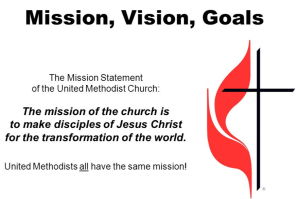Hello family!
So, this past Sunday we had a powerful service where we expressed our grief, our anger, and maybe even some hope. By now most of us probably know that last week the General Conference of our broader United Methodist denomination decided to try and restrict LGBTQ inclusion even further. I fully admit that in my own personal opinion, this was a terrible and morally bankrupt decision. I find the position of the General Conference theologically untenable and deeply cruel. Of course, not everyone may agree with me, and certainly all Christians have the right to their own study and theological interpretation. But I wanted to offer my own take on some scripture concerning human sexuality.
Firstly, I love the bible. I read the bible a lot. But I’ve noticed that sometimes Christians who take progressive positions on certain issues can be accused of being “unbiblical.” I think this is patently ridiculous. Wanting to interpret the bible thoughtfully, carefully, and in its proper historical and cultural context and with attention to the genre of the particular book (spoiler alert: the bible isn’t one book, it’s a library) is not “unbiblical.” It is responsible. Secondly, I don’t think of the bible as a big rule book to begin with. Certainly, there are places where rules are given. “Thou shall not kill,” for example. Or, “A new commandment I give to you. You shall love one another, as I have loved you.” But trying to take the theological experience and wisdom written over a two-thousand-year period in this vast collection of stories, myths, satires, histories, poetry, lamentations, wisdom literature, psalms, songs, gospels, and letters in order to create a list of neat and tidy “do this” and “don’t do that” is just a really poor way to approach the bible to begin with.
Okay, that being said. Let’s talk about a couple bible verses near the beginning of Paul’s letter to the Romans. So much pain, struggle, and heartache that are occurring in Christianity right now have a lot to do with these two verses. “For this reason, God gave them up to dishonorable passions. For their women exchanged natural relations for those that are contrary to nature; and the men likewise gave up natural relations with women and were consumed with passion for one another, men committing shameless acts with men and receiving in themselves the due penalty for their error” (Romans 1:26-27). These are the verses often used to deny LGBTQ people inclusion. Folks read this and say, “See, homosexuality lies outside God’s intention for humanity. End of story. It doesn’t matter how you feel about it. God said no homo, and God wouldn’t have said that unless it were ultimately for our own good. Stop trying to wriggle around God’s word and justify your own sinfulness.”
Okay. So, let’s slow down and dig into these verses. Firstly though, that Paul’s theological judgement is automatically meant to have legalistic power over modern-day Christians is an assumption that I think should be questioned. (Remember, this is the same guy who said women have to cover their heads and should never speak in church. And yet you don’t often hear a lot of the people who say God doesn’t want gay people to be married saying ladies have to cover their heads.) That aside, I would argue that the interpretation “God said no homo” is actually a really poor interpretation of these verses. It’s poor in part because it doesn’t interpret Paul’s words in the light of his context or purpose. Paul is making an argument about idolatry. In Paul’s day in Rome, there was a big temple to the god Cybele, and as a regular part of worship to Cybele, people would go and perform sexual acts with temple prostitutes. Some men were castrated to be used specifically for temple prostitution with male worshipers. How the apostle Paul would react if we could time machine suck him into our world and confront him with the LGBTQ community I don’t know. What I do know is that the common homosexual practices of Paul’s day occurred as acts of pagan prostitution-based idol worship. The whole theme of Romans chapter one is idolatry. Paul describes the never-ending idolatry of gentiles, and then turns on his audience in chapter two to tell them that they’re no better and just as idolatrous. He references one of the most obvious examples of idolatry that his intended audience would have been familiar with at that time, homosexual pagan temple prostitution. Given its historical context, trying to apply these verses to the modern-day LGBTQ community is unjustified and deeply problematic. So, the next time someone tells you that your Christianity isn’t biblical, you can advise that they study the bible more deeply. Anyway, those are some of my thoughts.

Grace and peace,
Savvy



